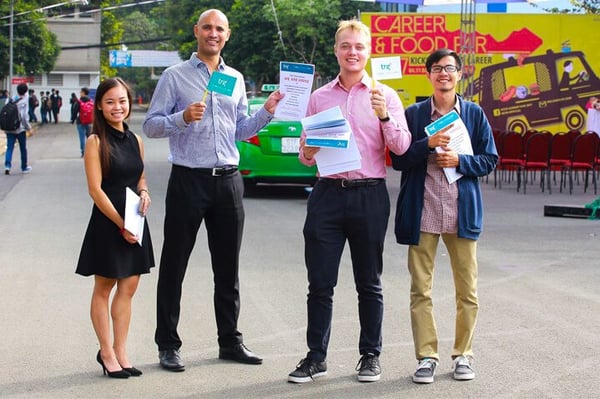Did you know that the term internship was only used for doctors who have completed their degree but lack a license? Today, it is a blanket term to describe last-year university (or college) students who want to venture into the corporate world.
Getting an internship can significantly benefit your professional growth. Students with internship experiences stand out more in the competitive job market as they require less training and are ready to take on real responsibilities.
Who hasn’t experienced this catch-22 situation when they first joined the job market? You need experience to get a job. But how can you gain experience until you get the first job that gives you the much-needed experience?
Including non-professional experiences like volunteer work, extracurricular activities, and even side jobs in your CV can certainly help. But nothing beats real work-related experience. This is why undertaking an internship provides so much value to students.
Certainly, nothing is wrong with going after your first full-time position with the employer of your dream. But going straight into the workforce can be a bit of a shock to anyone.
Internships are a great way to ease yourself into the corporate world, helping you to get used to the way a company operates. You may find that what is taught in textbooks are much different from reality.
In addition to gaining relevant skills and knowledge, here are 5 additional benefits to an internship:
Have you ever wondered what does an intern do in a day? Do they make coffee for the entire team? Do they fetch documents from the storage? Do they sort paperwork? Modern interns are doing more than that. They play supportive roles and are given real responsibilities.
Depends on the industry and the company, an intern's responsibilities may vary. For example, here at TRG International, our interns’ top priorities are to assist, learn, and grow. Their daily tasks range from managing the company's social media profiles to organising events, market researching, procedure mapping, content producing, etc.
Internships provide you with a multitude of ways to acquire new technical skills needed to fulfil your work. You can also expect to brush up on your soft skills, such as time management, conflict management, relationship building, etc. which are equally critical as your hard skills.
Initially, only the private sector and large businesses have the budget to pay for interns. It is not uncommon for internships to be unpaid.
However, more and more organisations are acknowledging the value of internship programs and the enormous benefit they contribute to the recruitment process. Many companies today are offering pay packages to students.
Interns can also be considered to move into full-time roles. Businesses that offer paid internships often decide to do so, and they evaluate their interns very thoroughly.
Many students undertake internships in exchange for college credit. What this potentially means is the project (or experience) they manage is convertible to academic credits.
Students who undertake this type of programs will usually have an academic mentor who oversees their entire internship journey. As part of the criteria, students may be required to complete assessments or evaluations upon completion to summarise what they have acquired throughout the course.
In simple terms, students apply for an internship opportunity at a not-for-profit organisation of their choice, such as:
Generally, this type of internship is unpaid as these organisations' primary focus is not to make money. Nevertheless, non-profit internships provide abundant opportunities to rack up useful knowledge that various employers seek after.
Summertime is the most popular time of the year for students to undertake internships. Students tend to choose summer internships due to having ample free time. Without constraints from other commitments, such as school assignments, students can dedicate their full attention to their work.
Summer internships primarily focus on helping students to develop specific technical and soft skills. Summer internships, as the name implies, typically last for three months. Once complete, students then continue with their studies or look for a new internship opportunity.
Co-operative (or co-op) education incorporates academic education with relevant practices. Commonly, co-op programs take up more than one semester and can last one to several years, which are longer than a typical internship.
Students will alternate academic terms and work terms, and they can undertake several co-op work terms back-to-back or arrange to attend both terms simultaneously.
Students will be able to enhance their learning in an appropriate work setting as well as to build their professional network.
Externships are also known as Job Shadowing, programs where students gained insights in their interested fields of work by following (or "shadowing") a professional.
Externships typically finish within a day to a few weeks. Students will be able to gain a bird's eye view about the day-to-day activities and responsibilities of a particular employee and determine whether this is the path they should be heading.
Externships are a great way to test drive the positions/ industries before committing to an internship.
Apprenticeships vs Internships - Some of us often get these two terms mixed up. The common understanding is that both -ships provide on-the-job training, which is accurate. But this is where the similarity ends.
A definite advantage of apprenticeships is all apprentices get paid. Apprentices are highly competent as they need to develop both technical and academic skills to fulfil their responsibilities. On the other hand, internships can be either paid or unpaid, depending on the companies.
A second factor that separates the two terms is the length of time. Depends on the function, an apprenticeship can last for years and requires a full-time commitment. Internships typically finish within one semester or up to a year, and 3-month programs are what most of companies offer.
In some cases, interns can be rotated to a full-time position after completing the program. However, this is not always the case. Apprenticeships are the complete opposite. Since the employers are sponsoring the training, apprentices are almost guaranteed to have a job that pays well after finishing.
Job shadowing is when you are assigned to observe a professional, an employee, or a senior worker performs their daily responsibilities. Job shadowing can be organised through a company, school, or a workforce program.
One can participate in multiple job shadowing sessions before deciding their professional route.
Besides lasting much shorter than internships, participants of job shadowing programs also perform much fewer complex duties than typical interns do. Nevertheless, this also depends on the job and the industry.
For example, medical and nursing students often shadow more experienced doctors and nurses to gain hands-on training and skills.
Typically in Management Trainee (MT) programs, groups of trainees are formed to work under the supervision of an experienced manager. Their job is to learn about every aspect of daily operation. After a designated time frame, they are rotated to a different function and continue their process of training.
MT programs are very common. Many organisations nowadays, such as Unilever, Coca-Cola, and Amazon, offer many forms of internship and MT programs.
With proper training and development for each individual, the company may be looking at their future leaders when they are still in their “infant stage”.
Continuous training and management feedback are integral parts of an MT program. Trainees will be able to understand every aspect of the business after finishing their programs.
MT programs can last for years and require a full-time commitment. Furthermore, a trainee will get paid during the MT program based on their levels.
Internships vs part-time jobs, which one should you choose? Both have their pros and cons. Many choose their path based on their current situation.
Taking an internship means you can work with experts from various fields, who can give you professional advice as well as letters of recommendation.
On the other hand, a part-time job helps you to offset the school fees and living expenses. Skills and connections gained from your part-time jobs are also beneficial and usable in your professional life. However, if the part-time job does not contribute to your intended career path, then accepting the job might halt your future.
With internships, your focus will be on learning specific skills to fulfil a task or a role. You will be introduced to a business system and work under professional supervision.
Training and learning you receive during the internship are on-going. Part-time jobs, though also provide training, tend to be for a short period, and you need to work independently from that point on.
Whichever path you choose to pursue, do not rush and think long-term instead. Where do you want to be in the next six months, three or even ten years from now?
Many college students today are applying for internships outside of their home countries. International internships are a great addition to your application. You can put your knowledge into practice, expand your worldview, and shape your career path.
How to apply for a summer internship abroad? There are three simple ways to go about landing your desired internship.
An internship placement agency provides a wide array of services for you to choose from. They offer quality information by matching your skills and knowledge with a suitable internship, negotiate the contract and visa on your behalf.
For example, TRG International collaborates with StudySEA and InternVietnam, who have brought us many rounds of excellent interns for our teams.
You would be surprised how many companies offer internship opportunities through partnerships with universities to ensure a steady stream of quality talents. Conversely, universities can take advantage of these internship programs to boost their students' employability.
Your university probably has a similar connection with several businesses. They may even regularly organise global internships through their study abroad office or connect with a company that does.
This do-it-yourself route often requires more effort; on the bright side, you will acquire useful experience for future job search and application. It certainly is tempting to apply for multinational corporations that have offices worldwide, but smaller companies are also worth considering. You will have a higher chance of acceptance with SMEs, and they can also give you more attention during your internship.
Vietnam is a land full of opportunities. Hence, why not choose it to kickstart your career and immerse yourself in a new culture.
At TRG International, we always welcome students of any major, school, city, and country to join our diverse teams of multi-talented individuals. That is why we created this guide to answer your utmost concerns about interning in a foreign country.
We have had interns from all over the world. We make it our top priority to make sure our interns can make the most out of their programs through detailed on-boarding and induction plans, friendly welcoming lunches and team bonding times, and one-on-one feedback sessions.
Expatriates who wish to enter Vietnam required to have a valid visa. For students who want to undertake internships for a foreign or a Vietnamese company in Vietnam need to obtain appropriate visa type, also known as DH Student Visa.
Currently, Vietnam is allowing citizens from these countries to apply for an e-Visa. The visa application and payment processes can be done via the Vietnam e-Visa Portal.
For more information regarding DH student visa, check out the Immigration's FAQ page, or do not hesitate to contact us if you have any queries.
TRG International has hosted interns from the US, Denmark, Poland, United Kingdom, Vietnam, Korea, China, Belgium, France, Switzerland and more for the past 20 years.
Students from these universities and schools have applied to work at TRG:
Check out James and Lars’ internship experiences in Vietnam through the following videos. More testimonials can also be viewed here.
We are proud of having an open and friendly work environment where everyone is treated equally, and we can learn from each other.
You are in complete control of your entire internship. We encourage you to take a proactive role in letting us know:
We are even eager to know the type of coffee you enjoy. Rick, our CEO and Founder, strives to catch up with all interns as frequently as possible on how things are progressing. The frequent feedback allows both TRG and you as an intern discover areas that need improvements and what TRG can do differently to ensure your journey is pleasurable.
Learn from past mistakes and continually improve ourselves are two of the core values here at TRG.

At TRG International, we practice Kaizen - the mantra of continuous learning, making small changes one day at a time.
We understand that nobody is perfect, and everyone makes mistakes. And that’s okay as long as you learn from it. We encourage you to be proactive and challenge yourself to keep on “transforming.”
As such, we look for interns who are self-motivated and are not afraid to ask questions. If there is a better way to increase the overall productivity or enhance TRG’s current procedures, do speak up and let us know what you think. We appreciate every comment from you.
Since the day we started our internship programs, we have had interns joined in every team at TRG, from the most popular ones like Marketing, Human Resources and Accounting to the more technical ones like Project Management, Software Development, ERP, etc.
Here is a sneak peek into what our Marketing and HR interns are currently working on:
Psst! We have compile some tips to write a great cover letter to score a marketing internship. Check it out!
There are two ways to apply for an internship at TRG International.
At the moment, TRG is partnering with StudySEA and InternVietnam. TRG also partner with RMIT University Vietnam in various internship programs and employment opportunities.
Direct application is a straightforward process. TRG Recruitment team simplifies the entire cycle into the following steps:
Step 1: Explore our currently available positions and view their job descriptions
Step 2: Apply for the role you desire
Step 3: Complete a 45-minute online assessment, which our HR member will send you an email detailing how to access the assessment.
Step 4: Schedule an interview with us
Step 5: Accept your offer. Welcome to TRG International!
Subscribe to TRG Blog for instant updates on the latest news and trends in the business world.
Simply fill in the form on your right hand side.
The internship has been overwhelming. I've learned a lot of things I have not expected. I have improved on three specific aspects: culture awareness, project management, and communication in a professional context. Vietnam provides a lot of great opportunities for me personally to learn new things, to meet new people, and to travel to new places.

Lars Maegaard Delivery Management Intern
My experience in Vietnam was not what I had imagined it to be. If I had to pick one highlight from my experience as an intern at TRG, it would be when we launched the TRG website. We have been working on it for a very long time.
We have also received lots of internal training, which are very beneficial to people like me, who lack the real-world skills and knowledge.

James Garbutt Marketing Intern
IT, Talent and F&B - we think it's a great combination.
We've thrived since 1994 resulting in lots of experience to share, we are beyond a companion, to more than 1,000 clients in 80+ countries.

© 2023 TRG International. Privacy Policy / Тerms & Conditions / Site map / Contact Us
TRG encourages websites and blogs to link to its web pages. Articles may be republished without alteration with the attribution statement "This article was first published by TRG International (www.trginternational.com)" and a clickable link back to the website.
We are changing support for TLS 1.0 and older browsers. Please check our list of supported browsers.